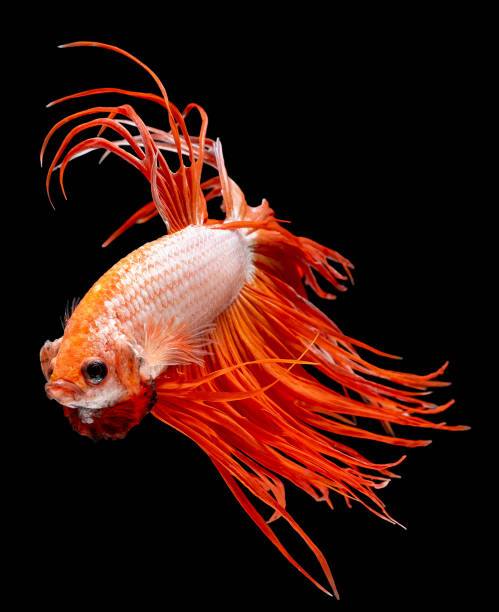Why Betta Fish Skin Turning White: Causes, Prevention, and Maintenance Tips
Betta fish are small colorful freshwater tropical fish that are popular for their personality, beauty, and aquarium compatibility. Betta fish came from Asia where they live in warm water with natural vegetation and have a high level of algae and bacteria. Betta fish’s skin color can vary depending on the individual fish. Betta fish’s skin color is affected by more than one factor. The color of the fish’s skin is not always indicative of its health or temperament.
Betta fish skin turning white is a common occurrence in fish tanks, it may be caused by a number of factors including poor water quality, parasites, and disease. In some cases, the skin may become white due to an underlying medical condition or injury. If the problem is not addressed, the fish may die from dehydration or infection. If you notice your Betta fish’s skin turning white, it’s important to take him to a vet for a check-up to ensure that he is healthy and receiving the proper care.

Table of Contents
What Causes Betta Fish Skin to Turn White?
Stress
Betta fish’s skin color can also change as a result of stress. When stressed, bettas may develop pale or whitish skin due to the release of toxins from the fish’s body. If your betta is exhibiting any signs of stress, such as hiding in close quarters or displaying other unusual behaviors, it is important to take action and consult with a veterinarian.
Age
Betta fish skin turning white is not a common problem, but it can happen as the fish gets older. The skin may start to thin and become more translucent, which can make it easier for bacteria to invade the skin and cause infection. Additionally, bettas may experience a decrease in their natural pigment due to age or stress, which can also lead to white skin. If you notice your betta’s skin is turning white, there is no need to be alarmed; simply take steps to keep your fish healthy and happy and the skin will return to its usual color.
Illness
Betta fish may also develop white skin as a result of illness. This can include diseases such as Ich, which can affect the gills and liver, or more serious conditions such as fin rot, an infection that causes swelling and distortion of the fins. If your betta is displaying any signs of illness, it is important to take action and consult with a veterinarian.
Injury
White skin in bettas can also be a sign of injury. This may result from accidental damage, such as when your Betta falls out of the water or gets caught in something else. If you notice that your Betta’s skin is turning white and it has not been injured elsewhere, there is no need to be alarmed; simply take steps to prevent further injury and the skin will return to its usual color.

How to Prevent Betta Fish Skin to Turn White?
Betta fish skin turning white is a common problem that can be caused by a number of factors. Some of the most common causes of white betta fish skin are poor water quality, overfeeding, and disease. There are a few things you can do to help improve their health:
Water Quality
Make sure the water your betta is living in is clean and free from pollutants. If the water quality isn’t good, it will likely affect your betta’s overall health as well.
Parasites
Parasites can cause a wide variety of problems in both human and fish populations, so it’s important to check your tank for them if you notice your betta’s skin turning white. If parasites are detected, take appropriate steps to get rid of them before they harm your fish further.
Diseases
If your betta is exhibiting any unusual behaviors or has started showing signs of illness, it’s important to get him checked out by a vet. Some common diseases that can cause white betta fish skin include fin rot and Ich (Ichthyophthirius).
Food and Diet
A lot of times overfeeding can cause problems like obesity and diabetes in humans, which can also happen to be in betta fish. Overfeeding can also lead to obesity and stress, which is one of the main causes of betta fish skin turning white.
How to Maintain the Color of Your Betta Fish?
If you have a betta fish that is starting to turn white, there are a few things you can do to help make it more colorful. First, make sure the water is clean and clear. Bettas need good water quality to stay healthy, so make sure the water is clear and free of debris. Second, feed your betta a diet that includes plenty of fresh vegetables and fruits. This will help keep its color vibrant. Finally, keep your betta in a well-lit environment so it can get the best possible sunlight exposure.
Use Color-Enhancing Food
Betta fish are tropical fish that are commonly kept in home aquariums. Bettas are considered to be hardy fish, but they do require a good diet to stay healthy. Many people choose to feed their Bettas color-enhancing food to help keep their skin colors vibrant.
Provide a Spacious Aquarium
Betta fish are tropical fish that enjoy a lot of swimming space. Make sure your tank is big enough for your betta, as they can get up to three inches in length and three ounces in weight. A betta fish’s natural habitat is typically a small bowl or vase, so make sure the tank you choose has plenty of room for swimming.
Add a Heater and Filter
Betta fish skin turning white is a sign that your tank has a heater and filter. A heater helps to keep the water temperature stable, while a filter removes debris and impurities that can cause your fish to develop white skin. Make sure you have both installed and working properly in order to keep your betta healthy.
Improve Water Quality
Betta fish skin turning white is a sign of poor water quality. Poor water quality can cause a number of problems for betta fish, including stunted growth, decreased fertility, and even death. To improve the water quality in your tank, make sure to add proper amounts of dissolved oxygen, carbon dioxide, and other nutrients. You can also try using a filter to remove debris and pollutants from the water.
Avoid Overcrowding
If you have a betta fish, it’s important to remember that they are tropical fish and as such need plenty of water to swim in. Overstocking your tank with betta fish can lead to them having difficulty swimming and can also lead to them getting sick. Many people think that overstocking their tanks is the best way to keep their fish healthy and happy. However, this is not always the case. Overstocking can lead to a number of problems, including the fish may become stressed and develop health problems, the tank may become overcrowded and contaminated with waste and bacteria, or fish may start to fight each other for food, leading to injuries or even death.
How to Keep Your Betta Fish Healthy
Keeping your betta fish healthy is important for their long-term success. Here are some tips to help keep your betta fish healthy:
- Provide a clean and well-lit tank with plenty of freshwaters.
- Feed your betta a balanced diet that includes fresh vegetables and fruits, as well as small amounts of live food such as brine shrimp or daphnia.
- Keep the water temperature at 75 to 80 degrees Fahrenheit (23-26 degrees Celsius).
- Avoid overfeeding or overcleaning the tank, which can stress your betta out and lead to health problems.